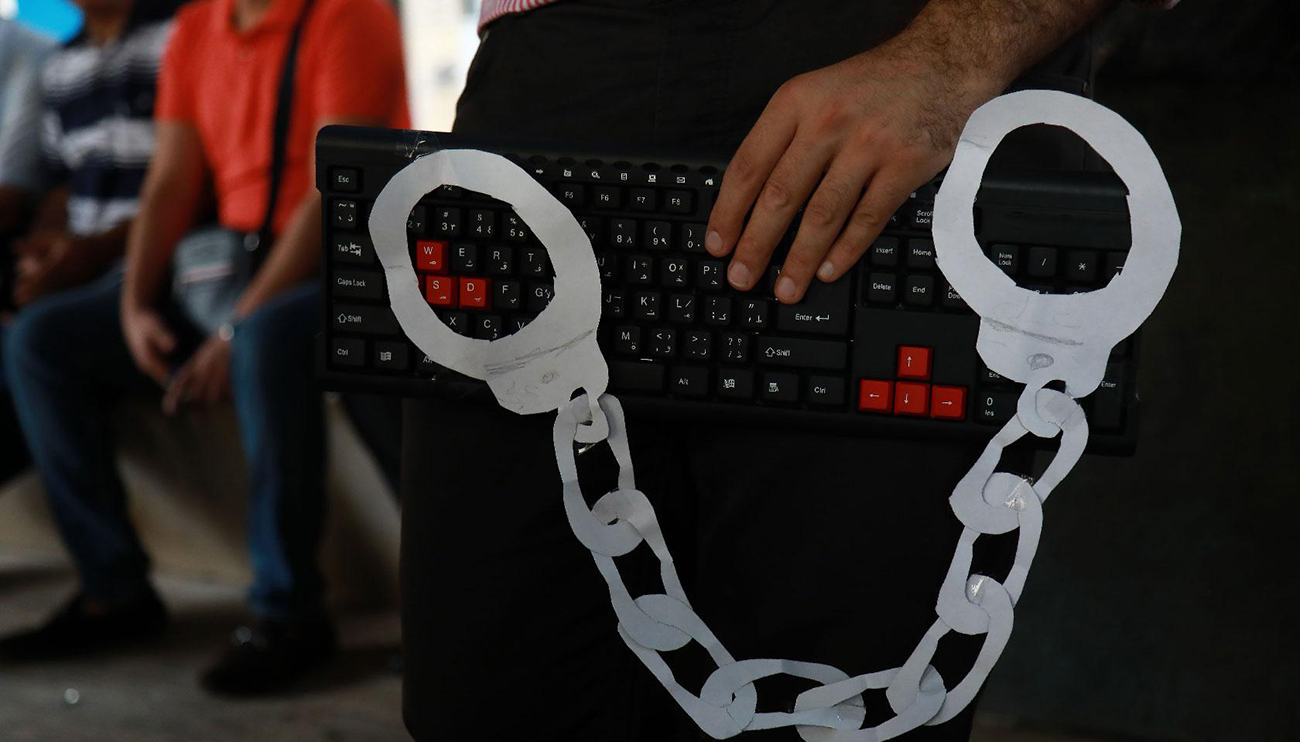Reem AlMasri
كانت مقاهي الانترنت والجامعات من أقل الأماكن التي يشعر بها مستخدمي الانترنت “بالأمان الرقمي”. هذه هي أحد النتائج المثيرة للاهتمام التي خرج بها استطلاع “انطباعات الرقابة على الانترنت” الذي اطلقه فريق لاسلكي، حبر، في آذار عام ٢٠١٣. هدف الاستطلاع الى جس نبض الأثر الذي يتركه انطباع المستخدمين في الأردن عن وجود رقابة على الانترنت، أو عدمه، على تفاعلاتهم على الشبكة. معظمهم أقر هذا الأثر، ومعظمهم يشعر بوجود نوع من الرقابة على الانترنت ما بين الرقابة الرسمية ورقابة العائلة والأصدقاء وأرباب العمل. على الرغم من أن لدى نسبة كبيرة من المشاركين وعي بوسائل وأدوات الحماية من الرقابة على الانترنت، الا أن معظمهم لا يستخدمها.
لا يمثل الاستطلاع جميع مستخدمي الانترنت في الأردن بتصميمه الحالي، ولم يهدف لذلك. أردنا من خلاله استكشاف أنماط لانطباعات المستخدمين حول الرقابة على الانترنت وتأثيرها على تفاعلاتهم. سطحية النتائج ولّدت حاجة للوصول الى فهم أعمق وأكثر واقعية لعلاقة المستخدمين مع معلوماتهم الشخصية الرقمية ومفهومهم عن الخصوصية. ومع تزايد نسبة انتشار الانترنت – من خلال الهواتف الذكية والأجهزة المحمولة، وبازدياد القصص التي تعكس وجود نوع معين من أطراف ثالثة تعالج بيانات المستخدمين بطريقة مباشرة وغير مباشرة، تولدت حاجة ملحة للإجابة عن سؤال: ما هو تصور مستخدمي الانترنت عن معالجة البيانات الرقمية الخاصة بهم وكيف تؤثر انطباعاتهم عن التهديدات المحتملة لخصوصيتهم الرقمية على عملهم ونشاطاتهم وتفاعلهم على الانترنت.
لهذا يعلن فريق حبر إطلاق الدراسة النوعية ” الخصوصية الرقمية: انطباعات وآثار” بالشراكة مع مركز المعلومات والبحوث-مؤسسة الملك حسين. تهدف الدراسة الى استكشاف معنى الخصوصية الرقمية عند مجموعات ناشطة في الأردن، بالإضافة إلى انطباعاتهم عن التهديدات التي قد تتعرض لها هذه الخصوصية، وتأثيرها على تفاعلاتهم الرقمية، ممارساتهم في عملهم وانشتطهم المختلفة. في هذه المشروع نستهدف المجموعات والأشخاص النشطين في مشاريع وأعمال تستدعي الاحتفاظ بمعلومات حساسة وشخصية، مثل صحفيين ومحامين، وعاملين في مجال حقوق الانسان، أو ناشطين اجتماعيين وسياسيين.
تأتي هذه الدراسة في وقت مهم تقوم خلاله وزارة الاتصالات وتكونولجيا المعلومات بتطوير قانون حماية المعلومات الشخصية.
سيوظف فريق البحث منصة لاسلكي لدفع النقاش حول الخصوصية الرقمية بالتواصل بالنتاجات أو القصص المثيرة للاهتمام التي ستخرج من المقابلات. نتوقع أن يكتمل البحث في أكمله في آخر سنة ٢٠١٤.
يتم تنفيذ هذا البحث أيضا بالشراكة مع مؤسسة سيتيزن لاب (جامعة تورنتو في كندا).
Internet Cafes and Universities were the least “digitally secure” places to log in from. This, among many other interesting findings, was reported by the respondents of the “Perception of Online Monitoring in Jordan” survey that the 7iber Wireless team has launched in April 2013. The survey aimed to get a feel of the interplay between users’ online activities and their perception of different online monitoring techniques. Most respondents believed in the existence of one type of monitoring or another: official surveillance, and monitoring by family, friends, and employers/coworkers. While most of them reported awareness of online protection methods, most did not take the measures to use them.
This online survey did not was not representative of all internet users in Jordan. It however intended to highlight trends between perceptions of online monitoring and its implications on the work they are doing. The generality of the results generated a need for an indepth understanding of their digital privacy and their relationship with their digital personal data and how it is being processed. As online penetration is growing, through smart mobile phones, and laptops, and the growing stories of direct and indirect digital processing of data, there was a need to answer: how do Jordanians’ perceive the processing of their digital data, and how are their perceived threats to their online privacy affect their work, production of content and interactions online?
Therefore, 7iber’s Wireless team announces the launch of a qualitative research, “Digital Privacy: Perceptions and Implications”, in partnership with Information and Research Center (IRCKHF)- King Hussein Foundation. This research attempts to explore the understanding of digital privacy of active groups and individuals in Jordan. It aims to also explore threats to their “digital information”, implications associated with their digital interactions and practices within their work and other activities. We are targeting groups and individuals in Jordan actively involved in projects that require collecting sensitive personal data ( such as lawyers, journalists, human rights, and NGO workers) or activists with a strong online presence.
We believe that this research is conducted at an important time in Jordan, especially as a draft of the Personal Data Law is being compiled by the Ministry of Telecommunication.
The research findings are expected to come out toward the third quarter of 2014; however, 7iber and the IRCKHf will be communicating their interesting findings to the wider audience throughout the process, in order to further develop the discussion on data protection issues.
This research is conducted in partnership with the Citizen Lab at the University of Toronto.
الصورة من موقع شترستوك | Feature image from Shutterstock







